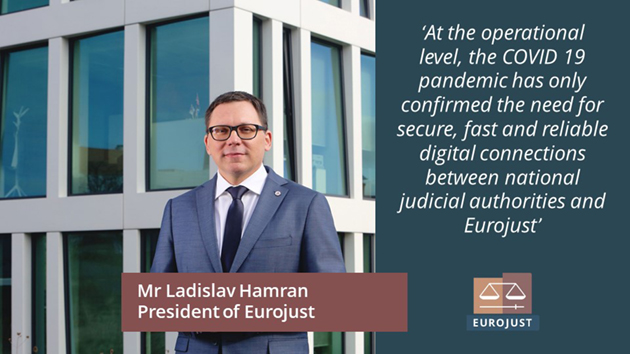Today, the European Commission published two studies, a study on digital criminal justice and another on the use of innovative technologies in the justice field, both which will feed into the upcoming Communication on digitalisation of justice.
Didier Reynders, Commissioner for Justice, said: “Going digital for cross-border judicial cooperation can bring huge benefits, which is why we must modernise information exchange and improve international cooperation. We are working to build an ecosystem of excellence supporting the development and acceptance of AI across the EU economy and public administration. I want to see us as the leading global actors in the use of innovative technologies. We can use these technologies to enhance justice.”

Ladislav Hamran, President of Eurojust, said: “Eurojust warmly welcomes this initiative by the Commission, which is a crucial step towards the much needed further digitalisation of cooperation in criminal justice. At the operational level, the COVID 19 pandemic has only confirmed the need for secure, fast and reliable digital connections between national judicial authorities and Eurojust. Eurojust is fully engaged in this process and ready to support any next steps to establish such infrastructure. I also want to thank Commissioner Reynders for his personal commitment to this process and the keen understanding he is showing for the real needs of judicial practitioners.”
The study on digital criminal justice presents a needs analysis for cross-border digital criminal justice cooperation, and suggests seven concrete actions to address the deficiencies found. These include creating a new Case Management System for Eurojust, as well as a specific IT-platform to create and support Joint Investigation Teams, to establish cross-links between cases, share large files, and update communication tools and channels. Following the October 2018 Conclusions from the European Council, Eurojust called for the creation of ‘Cross-Border Digital Criminal Justice’, a fast, reliable and secure IT infrastructure that would enable national prosecution authorities to interact with their counterparts, JHA agencies and EU bodies in the Justice and Home Affairs area.
The European Commission, supported by Eurojust, launched the Digital Criminal Justice project, for which today’s study presents recommendations for implementation.
The study on the use of innovative technologies concluded that better coordination of efforts and activities are needed at EU-level, since there are numerous projects in the Member States with similar objectives, problems and technologies. Better collaboration and experience sharing, as well as strengthening existing partnerships between European and Member State organisations would raise awareness about the benefits of innovative technologies and help solve specific problems. As outlined in the Coordinated Plan on Artificial Intelligence, the Commission plans to step up actions at multiple levels to support the development and uptake of AI across the EU economy and public administration.
Read more in the two studies.
